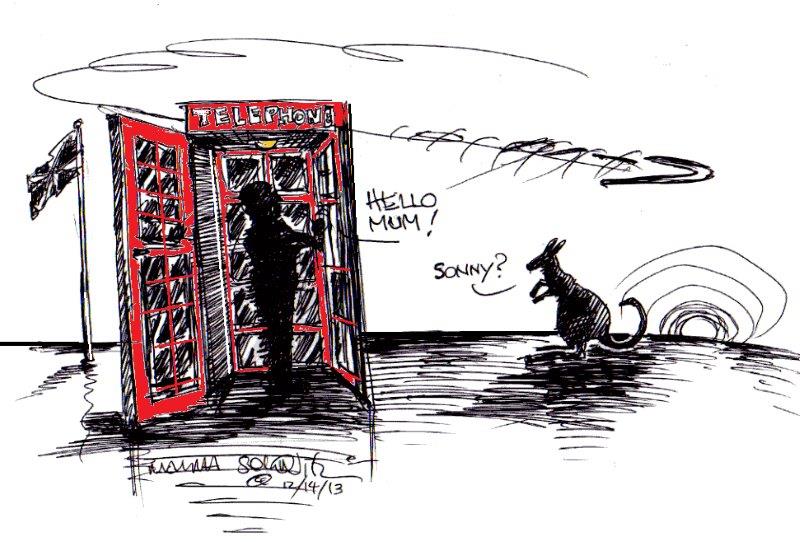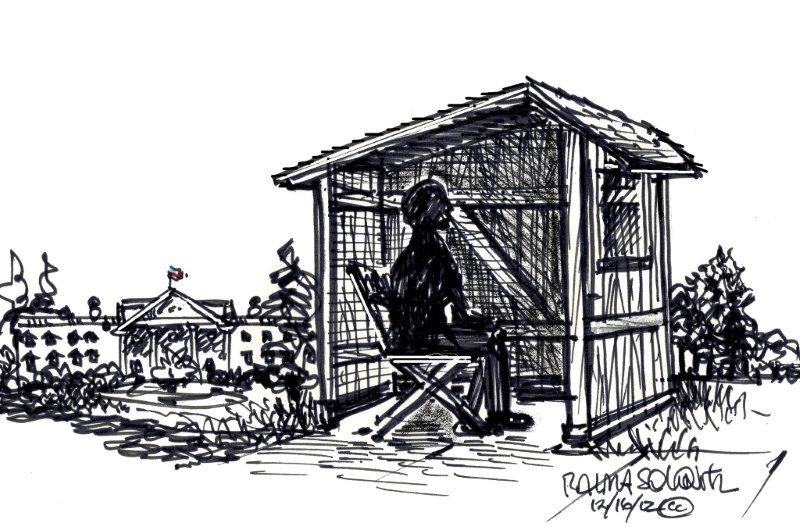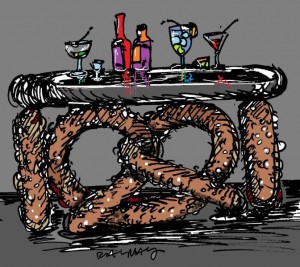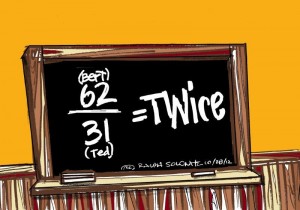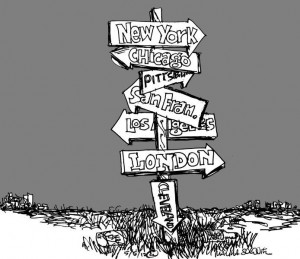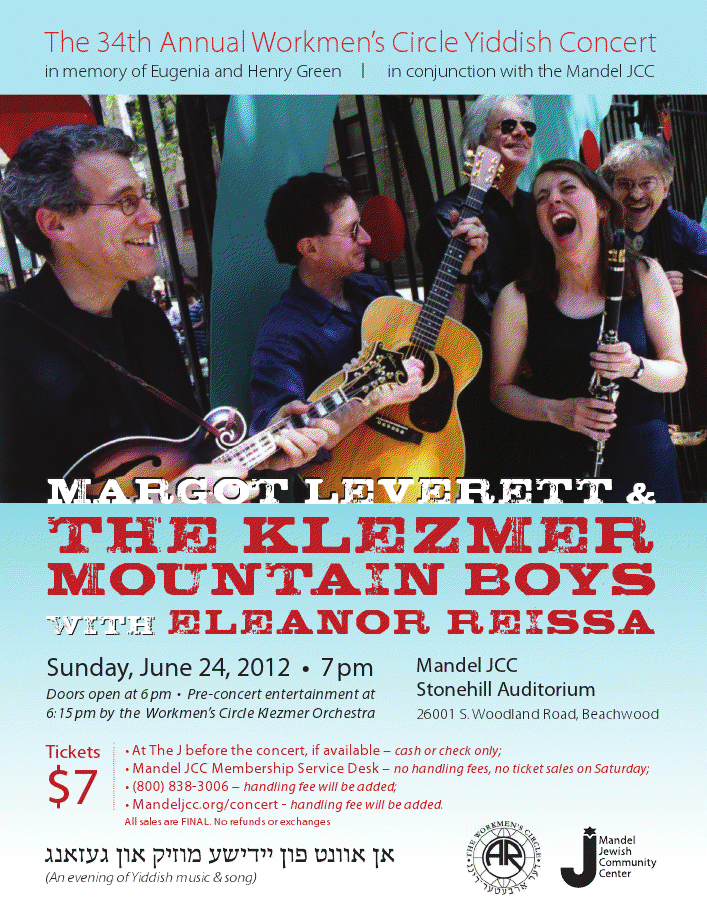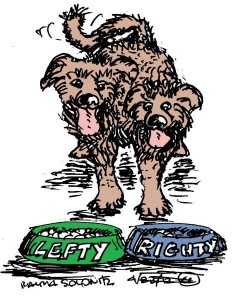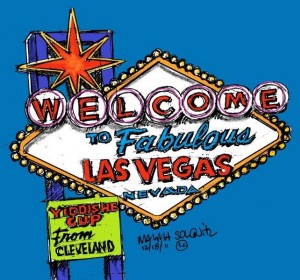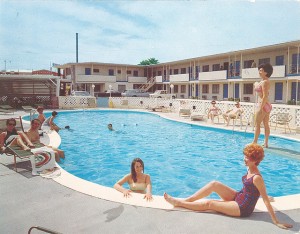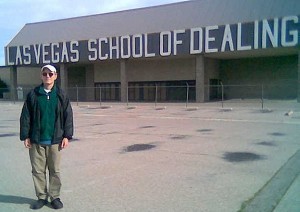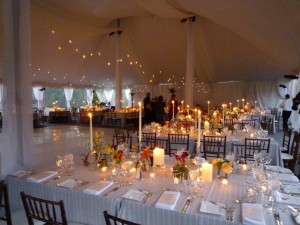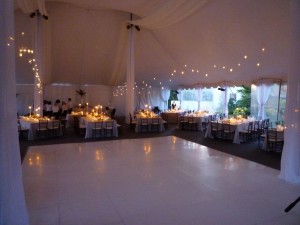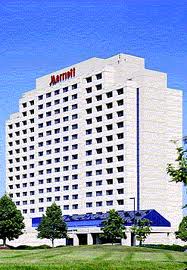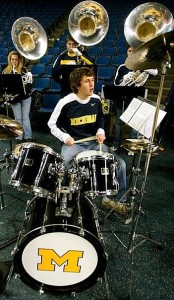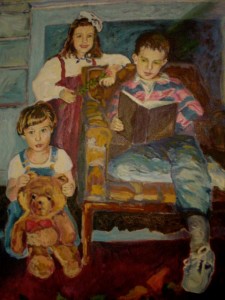Category — Kinder, Di
MY SON AND THE IRS
My younger son, Jack, got a certified letter from the IRS with a hand-written Post-it note on it. What did the gobierno want? The government usually sends unsigned computer-generated letters. Maybe Jack the Drummer Boy owed another $15 from his Michigan Wolverines basketball band income. (Jack was in college at the time.)
Why didn’t the IRS pick on me, instead? I wanted to be audited. I haven’t been audited since 1982. Thirty-three years of saving bills and income/expense statements and checks — and nobody wants to see it. Yes, I throw the stuff out periodically, but I replenish.
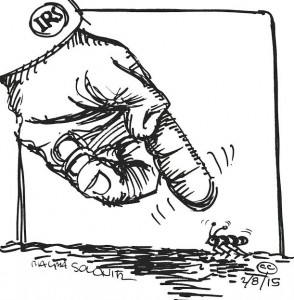 Jack told the IRS he made money as a camp counselor and playing gigs. He said his dad paid for college. Jack later told me, “The auditor was impressed you were footing the out-of-state tuition.”
Jack told the IRS he made money as a camp counselor and playing gigs. He said his dad paid for college. Jack later told me, “The auditor was impressed you were footing the out-of-state tuition.”
Thank you. No penalty. (Jack got a $68 credit.)
March 18, 2015 6 Comments
SLURPING THROUGH
THE UPPER MIDWEST
My son Ted was interested in ice cream. One summer he worked the night shift at Pierre’s, loading ice cream onto trucks. One summer he worked at East Coast Custard on Mayfield Road, making shakes.
He owned a shake mixer and concocted date shakes at home, using date crystals from California. He had a following (his mother).
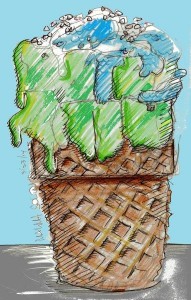 After his junior year of high school, Ted and I drove through the Upper Midwest, hitting A&Ws and assorted other chazerai shops, while looking at colleges . (He wound up at Brandeis. Oops.)
After his junior year of high school, Ted and I drove through the Upper Midwest, hitting A&Ws and assorted other chazerai shops, while looking at colleges . (He wound up at Brandeis. Oops.)
We rode the amphibious Ducks in The Dells, Wisconsin, and saw The House on the Rock, which Teddy described as an “affront to Frank Lloyd Wright.” Ted was good with words, even back in high school.
We visited the mustard museum in Mt. Horeb, Wisconsin. Then we hit the A&W, where Ted asked for a “mama burger, papa burger and a rooty tooty.” He knew that terminology from a junk-food guide.
That trip to the Upper Midwest was one of my favorites — l0oking for A&Ws and colleges with my son.
Root beer! (I’m still good for a Diet Hank’s or Diet IBC at Tommy’s in Cleveland.)
—
“Root beer,” to rhyme with “put beer.” That’s how we say it here.
April 9, 2014 9 Comments
RINGING HOME
I’m related to few Strattons. So I got a bit excited when I came across Jon Stratton, author of Coming Out Jewish. I found him on the Internet. Another Stratton writing about Jewish matters? Maybe I was Jon, using a pseudonym.
Jon Stratton is a cultural studies professor in Perth, Australia. His mother was Jewish and his father Christian. He grew up in England, not knowing anything about Judaism orYiddishkayt (Jewishness).
I ordered Jon’s book on Amazon. In 2000 he “came out Jewish” in multicultural academic circles, making a mark for himself by writing about “ghetto-thinking” — Jewish anxiety, basically. He said he had been slightly different from his friends in England because his mother had made him “ring home” whenever he went out, while his chums never had to ring home. Jon’s mother was an angst-ridden Jew from the Continent, he said.
My mother, on the other hand, was from the Delta (the Mississippi Delta) and didn’t worry much. My mother left me off at freeway exits to hitchhike. One trip I made a left on I-80 and wound up in South America. She was even OK with that.
In 1990, at the Cleveland airport, I waited for my mom to arrive on the “snowbird” flight from Florida, and I let my then 9-year-old son run around the airport. I told him, “If you wander off too far, you’re going home on the Rapid.”
He wandered off and I left him.
A Cleveland policeman called me a half hour later, and I had to go back to the airport — 20 miles one-way. The airport cop gave me a “you’re a douche bag” smirk when I entered the airport police office. The cop didn’t realize my son had practically memorized the Rapid Transit timetable and had ridden the complete Lee Road route.
I learned a lot about laissez-faire child rearing from my mom. The only thing Continental about her was her airline.
If I ever get to Australia, I’ll buy Jon Stratton a beer, and we’ll talk about our mothers, I hope. We’re mishpocha.
—
Footnote: I’m related to few Strattons because my father changed the family name from Soltzberg to Stratton in 1941.
—
Jack Stratton’s latest project. Also, check out the interactive map at Vulfpeck, which shows you where Vulfpeck’s fan base is.
—
Yiddishe Cup is at Park Synagogue, Cleveland Heights, 7:30 p.m. Saturday (March 15) for Purim. Gonna have Tamar Gray, soul singer extraordinaire, with us. Free and open to the public.
March 12, 2014 5 Comments
{TODAY I AM A MAN} X 2
My son Jack played his first professional gig with Yiddishe Cup at age 8, when I gave him five dollars to play “Wipe Out.” We were at a temple Chanukah party. Before that gig, he had done pro bono work, sitting in frequently with the band and stealing the show. The senior citizens loved him.
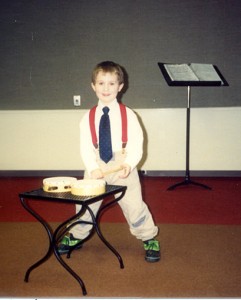
Jack, age 4, 1992, Beachwood library, tambourines and drumsticks.
Years later, Shirley Guralnik, a fan of the band, would ask me, “How’s the little one?” And I would answer, “The little one is in college now and bigger than me.” Shirley died in 2011. She had followed Jack’s career from the beginning.
Jack never got nervous. A case of nerves was hard to develop if, like Groucho Marx, your stage-mom (or dad, in this case) put you on stage practically in diapers.
I told Jack I would pay him $75 — real money — for a real gig after his bar mitzvah. He would be Yiddishe Cup’s drummer for some gigs. He wouldn’t just sit in.
He did great.
Jack got uptight only once. It was at his own bar mitzvah — not the music, reading Torah. The rabbi asked him, “How nervous are you on a scale of 1 to 10.”
“Eight.”
“That’s not bad,” the rabbi said.
Jack said, “I’ve never been an 8 before!”
***
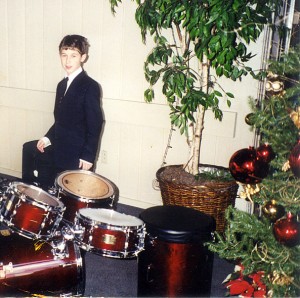
Jack, 13, 2000, at his first "real money" gig
Jack’s $75 gig was at the Barrington Golf Club in Aurora, Ohio. A country club staffer asked if she should light the Christmas tree for the bar mitzvah luncheon. I said, “Not a good idea.”
On the way home, we stopped by my dad’s grave on Aurora Road. I told Jack to place an old clarinet reed on the grave marker.
My point? 1) I didn’t have any old drumsticks. 2) I was at my father’s grave with my youngest kid, who I had just paid to work, just like my father had paid me (to paint walls, argh). The cracked reed fit into the Jewish star on the grave marker.
My son got the $75.
Jack’s band, Vulfpeck, 2013. Jack on keys.
(Today I am a man) X 2 = Age 26, 2013
October 9, 2013 2 Comments
IN JEOPARDY
At a Detroit wedding, the bride came down the aisle to Barbra Streisand recordings. She paused several times to read from her childhood diaries. She had 109 journals. (She read only from a handful.)
Eight years later, the bride emailed me and asked if I remembered her.
Yes. And I remembered the bridal dance we had played, and how we opened for a soul band (a good band), and how I announced the bridal party individually; one groomsman was Billy Wisse.
I had said Billy Weiss. He thanked me. I explained to him, “There’s a Ruth Wisse, a Yiddishist and professor at Harvard. I’ve heard the name pronounced before.”
“That’s my mother,” Billy said.
“No! Where do you teach?” I said. The Wisse family is scholarly; David Roskies, Ruth Wisse’s brother, is a professor at the Jewish Theological Seminary.
Billy said, “I write questions for Jeopardy.”
“That’s a job?” I said, pulling out a pen and jotting down Billy’s email address. My son Teddy — a college student then — would love a job at Jeopardy upon graduation. Teddy was on Brandeis’ Quiz Bowl team. (Quiz Bowl is Jeopardy minus the money.)
Two years later, Brandeis played in Los Angeles for the national championship. Teddy was on the Brandeis team. I gave Billy’s email to Ted.
Ted and his Brandeis teammates met with Billy Wisse for breakfast at Canter’s Deli.
Two years after that (2004), Ted got a business call at our house. He had recently graduated college. He wouldn’t pick up the phone. I yelled, “Pick up the phone, Teddy! It’s for you.”
Sony was on the line.
Sony owns Jeopardy. Sony offered Ted a slot on Jeopardy as a contestant. Sony sent a contract via FedEx. One paragraph read (paraphrased): “Do you know anybody from Sony or Jeopardy? If so, you can not be on the show.”
Teddy did not know Billy Wisse! Teddy and Billy Wisse ate breakfast two years prior for one-half hour. Also, there had been other Brandeis players at that breakfast.
At Sony Studios in Culver City, California, Billy Wisse stood by a computer at the edge of the Jeopardy set. Alex Trebek, the show’s host, wore a cast on his wrist. He had fallen off a ladder, he told the studio audience. He had been cleaning his gutters. Sounded odd to me. (I was in the peanut gallery.) A Hollywood guy cleans his own gutters? Maybe. There are low gutters in California.
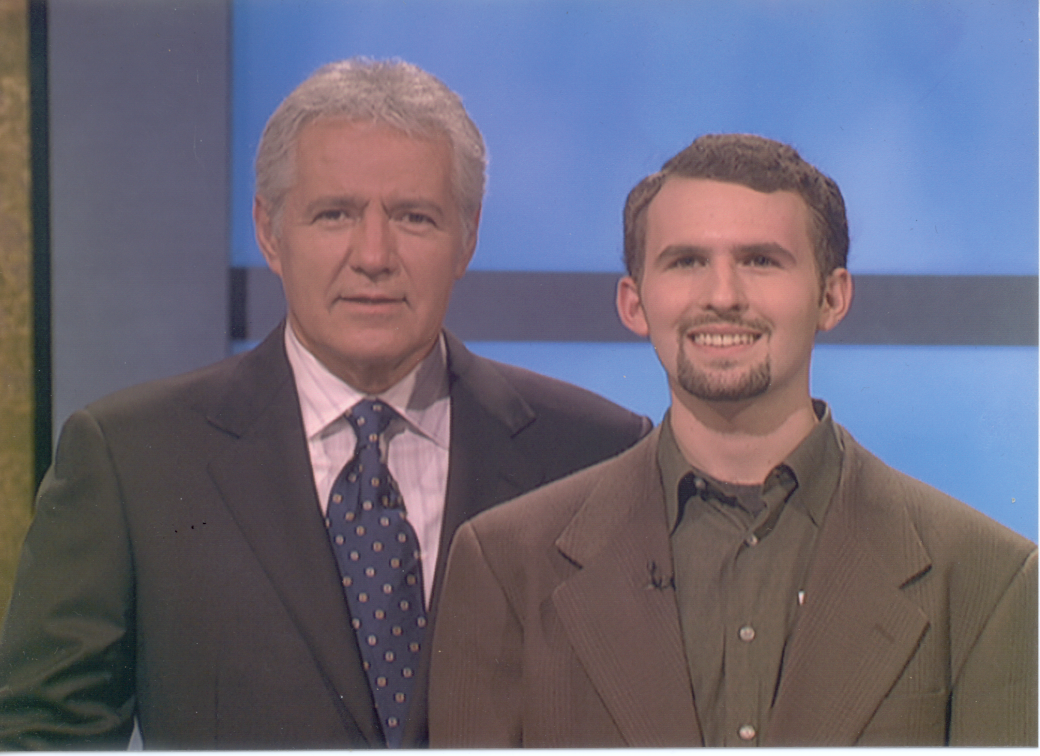
Alex Trebek and Ted Stratton, 2004. (Show aired in 2005)
Jeopardy tapes five shows a day. The show’s contestants for that day sat in rows isolated from the studio audience. Whenever an on-deck contestant went to the bathroom, he or she was escorted by a guard from Standards and Practices, which monitored cheating.
The first game was between an Idaho man, a Washington state woman, and the defending champ, “a schoolteacher from Lancaster, Ohio.”
The Jeopardy stagehand said, “Lights, camera.” But no “action.” Wisse and other Jeopardy employees huddled at the side of the set. They looked at computers and talked to each other. This went on for about a half hour.
Wisse, you do not know my son. Have rachmones (pity), Wisse. You see 11 Jeopardy contestants per day; they’re mostly all young white guys who look alike. You do not know Teddy!
The Jeopardy people couldn’t locate the appropriate random packet of questions for the first game. That was the hold-up. Everything had to be kosher — up to Standards and Practices.
Teddy didn’t play that morning.
Lunch break was at Quizno’s for the peanut gallery. (The contestants ate in the Sony cafeteria.) At Quizno’s, the girl friend of one contestant said, “I don’t care if Jonathan wins or loses. I don’t love him for his game playing.”
Shut up. I was so nervous I couldn’t eat.
Teddy didn’t play the game after lunch either. I asked an usher, “What if my son doesn’t play today?”
She shrugged.
Teddy made it onto the final game of the day. He faced a Boston book editor — the defending champ — and “a graduate student originally from Johnson City, Tennessee.” That was Jeopardy-speak for “a graduate student now living in Cambridge, Massachusetts, doing a post-doc at MIT.”
Ted did well in the Double Jeopardy category “Our Lady,” about Catholic shrines. The “Our Lady” questions covered Our Lady of Czestochowa (Poland), Our Lady of Gethsemane (Kentucky) and several others. This is what my son learned at Brandeis.
Heading into Final Jeopardy, the Tennessee grad student was in first place. Ted was in second, and the defending champ, Boston book editor, was in third.
The Final Jeopardy category was Fictional Children. The answer was: “This boy, introduced in a 1902 book, flew away from his mother when he was 7 days old.”
I felt like I was watching my kid line up a 50-yard field goal at the Ohio State-Michigan game with one second left on the clock. That is the weird part about being a parent — all that collateral joy and pain. Merv Griffin’s Jeopardy think-music ended.
The Boston editor, in third place, answered, “Who is Peter Pan?”
Right-o. She went up to $10,900.
Teddy said, “Who is Peter Pan?” Right. He went up to $13,399.
The graduate student from Tennessee said, “Who is the Little Prince?” He went down to $7,900.
Alex Trebek announced, “The new champion, Ted Stratton, a reporter from Cleveland Heights, Ohio!”
—
Footnote: For $500, “Who is Billy Wisse?” Answer: a mentsh.
For a blow-by-blow of the game, see Robert KS’ J! Archive.
January 23, 2013 No Comments
THE BIG THRILL
I went to the White House for a Christmas party. Did you?
My daughter, Lucy, works for a Chicago event-planning company, and she helped decorate the White House for Christmas. She got me in.
Lucy and I arrived fashionably late, because my daughter has been to the White House before, and she didn’t want to wait in the long line. We were the last guests — numbers 485 and 486.
I was denied entrance. What?
I sat on a folding chair in a heated tool shed–like room in the White House backyard. My birth date was listed incorrectly on the White House checklist. I thought I might miss the party.
But the guard, constantly checking her smartphone for updates, finally said, “You’re good. Tell the next security booth, you’re a re-clear.”
I was a re-clear at the next security stop — a dog-sniffing station.
A Marine Band jazz quintet played in the main entrance of the White House. Michelle Obama was there. Lincoln’s portrait was up in the State Dining Room. There were 54 live Christmas trees, according to the Washington Post. Plus some fake trees — classy fake trees, like out of glass.
I told the Marine Band’s bass player to tell his boss to bring in Yiddishe Cup for the Chanukah party next year.
I did not see Bo the dog. I did not sleep in the Lincoln bedroom. I did not see any celebs. The food — at grazing stations — was very good. Spielberg, dressed like Lincoln, was at the White House a couple nights before, to screen Lincoln with the president. That was the word at the party. There was a 300-pound gingerbread replica of White House.
This event was a thrill for me — a once in a lifetime experience. No, wait, I’ve got to talk to my rabbi; he once lit the White House Chanukah menorah. Maybe he’ll know how to get Yiddishe Cup in.
My rabbi called. He said, “Somebody from the synagogue got me in. Or a group of people. No one person from the synagogue took sole credit. Maybe the White House wanted somebody from Cleveland.”
The Jews of Cuyahoga County. Work with them.
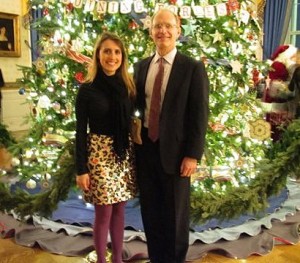
Lucy Stratton, Bert Stratton, and Claus.
White House, 2012
—
SIDE B
KLEZKAMP 2012
This year’s KlezKamp theme is anti-NY.
No rush-rush.
The KlezKamp swimming pool has piped-in klezmer music. Don’t do the crawl; your wildly flapping arms will drown out the underwater speakers. (Kapelye’s classic, “Chicken,” is looped.)
New this year: a pretzel bar . . . Rold Gold, Dan Dee, Snyder’s of Berlin, Snyder’s of Hanover. (Trucked in from Cleveland. Heymish.)
There is a spiritual gathering every morning in the exercise room. Universal love machines. Yarmulkes optional.
You can touch your musical instrument but can’t play it. Oil keys, apply grease to cork joints, rub valve oil. And calm down.
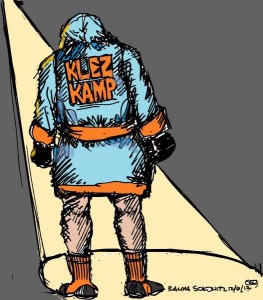 Dress code? Only if you insist. Try the all-cotton plush bathrobes with the KlezKamp logo ($179). Notice how young klezmer musicians wear KK bathrobes on stage?
Dress code? Only if you insist. Try the all-cotton plush bathrobes with the KlezKamp logo ($179). Notice how young klezmer musicians wear KK bathrobes on stage?
At KlezKamp, director Henry Sapoznik repeats the same spiel every hour, so you don’t miss anything if you skip a lecture. His topic this year: “New York Sucks. I Moved to Wisconsin.”
Also, this year pianist Pete Sokolow blots out — pours Manischewitz on — his classic how-to book, 100 Jewish Music Insults That Really Work.
Before this book disappears forever, here are, for the record, Sokolow’s five favorite putdowns:
1. What’s your phone number? Junior congregation needs a clarinetist.
2. You’re slicker than butter on matzo, but there’s no salt.
3. Tighten your neck strap. Tighter.
4. You couldn’t find D freygish with a GPS.
5. I make desk lamps. Let me see your clarinet.
—-
This is KlezFiction. KlezKamp is real. It happens next week.
December 19, 2012 7 Comments
I’M TWICE AS OLD AS YOU
I liked to provoke my mother-in-law. She would say, “They’re wearing their hair high in the 1940s look.” And I would say, “Who’s they?” Or she would say, “I don’t have any shoes to wear tonight to the party.” And I would say, “You going barefoot?”
I shouldn’t have been such a smart aleck. I hung around Harvey Pekar, who was inspirational — very bitter. “I’m hateful,” he said. “I’d like to have a cool way to slip my George Ade article to Lark [Pekar’s second ex-wife, an academic]. She’s small-minded. Who wants to dig through Ade’s school grades? So what. I want to do something more creative.”
This was in 1981.
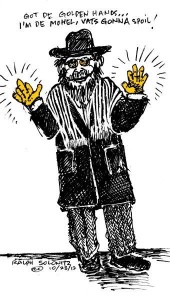 Now I’m twice as old as my son Ted. Exactly twice as old. He’s 31. Pekar was at Teddy’s bris. Pekar considered writing a comic about the mohel raising his hands like a prize fighter and saying, “Golden hands!”
Now I’m twice as old as my son Ted. Exactly twice as old. He’s 31. Pekar was at Teddy’s bris. Pekar considered writing a comic about the mohel raising his hands like a prize fighter and saying, “Golden hands!”
Ted has been a newspaper reporter and taught English in Korea. He has a law degree. He was on Jeopardy. He has worked temporary crap jobs, too. He has done a lot, but he’s still only half my age!
Here’s what I’ve learned in the past 31 years:
1. Guard against bitterness
2. Make your job interesting
3. Do something beneficial for others
4. Zekhor (Remember)
5. Get married and have kids
6. “Don’t just view it, do it” (Shari Lewis)
7. Old people are dumb! (joke)
8. Don’t judge people by bumper stickers, neighborhoods, or their tastes in music.
I hope to list 10 items by the end of the decade. (Make it to the end of the decade, then worry about the list, dude.)
***
When my youngest child, Jack, moved to California last year, I held a mini-shiva; I walked through the music room in the basement and threw out old mic cables, cassette tapes and tons of drumsticks.
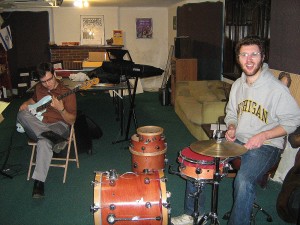
Eli “Paperboy” Reed (L) and Jack Stratton down the basement, 2011
Jack took his drums and an electric bass out west. I called him when he was driving through Nebraska, and said, “Did you open the letter I wrote you?”
“Yeah,” he said, “my friends thought it was funny that on the envelope you wrote, ‘Don’t open till Nebraska.’ They thought it contained hallucinogenics.”
I’m anti-drugs! I was dispensing wisdom-in-a-can (in an envelope) to my youngest child. If he could combine my old guy’s experience with his 24-year-old’s enthusiasm and creativity, he would do fine. [Story about the letter is here.]
I filled up four contractors garbage bags in the basement.
I hauled the stuff to the tree lawn on garbage day. An hour later, three bags were gone, but the fourth remained. A junk man had picked up three bags. And I had put some paperwork in those bags, as well as Jack’s garbage.
Mac — the junk guy — pulled up the next week in a pickup truck. He said he liked my trash, particularly the ersatz medieval knight’s helmet from my son’s high school days.
I said, “What about the paperwork?”
He said he had pitched that. Good. I didn’t want my identity stolen that day. He handed me his card.
Age 24 is when you have the least amount of possessions. Now Jack has even less –- four bags less.
And Mac has some good stuff, like the helmet.
—
Yiddishe Cup is at the College of Wooster (Ohio) 9:30 p.m. Sat. (Nov. 17). More info here.
November 14, 2012 5 Comments
COOL CLEVELAND
My daughter, Lucy, is a corporate event planner in Chicago. She has done work for the president, Oprah, McDonald’s, Coke and Target. She has worked gigs from Turkey to Australia. Maybe I’m not allowed to say all this. (I’ll clear it with her.) She said to me, “We’re doing something [in Chicago] for Topshop. Do you know what that is, Dad? It’s a women’s fashion store from London. They want to bring in their own fashion-show coordinators from New York. They don’t trust Chicago.”

Lucy Stratton in Chi, Dec. 2007
Chicago is fourth — behind New York, Los Angeles and San Francisco — in American coolness, Lucy said. “They think we’re hicks.”
What do Londoners think of Cleveland? Do they think it’s in northern England? I think Cleveland is in northern England. [Yes, it’s a county near Scotland.]
Cleveland, Tennessee. Magic Chef makes stoves there.
Boston. That was a cool town once. In the early 1970s, young people headed to Boston. The town was popular because, for one thing, it had James Taylor . . . “[The turnpike was covered] from Stockbridge to Boston.” The Ohio Turnpike was covered from Youngstown to Toledo, but nobody noticed that.
New York wasn’t that popular in the 1970s. Chicago wasn’t either.
These days Chicago attracts young people from all over Big Ten country. Whenever I meet baby-boomers in Cleveland, I assume their kids are in Chicago unless told otherwise.
I like Pittsburgh.
“Keep Austin weird.” That’s so lame.
I would like at least one of my three adult children to move back to Cleveland. But I’m not twisting my kids’ arms. Cleveland ain’t happening, at least not like the Big Four (Chi, LA, SF and NY).
The Big Four gets old when you get old, kids.
Which city is number five? Minnie? Seattle? DC? Cleveland?
Cleveland. (I just polled myself.)
—
SIDE B
JEWS, GOD AND BAKERY
My challah purveyor is On the Rise Bakery in Cleveland Heights. I know the owner and some of the help.
I went there to put up a poster for a klezmer concert:
The cashier said, “We don’t do religious events.”
What?
I stammered, “It’s not religious. It’s the Workmen’s Circle. It’s secular. It’s bluegrass and klezmer.”
I wonder if the owner is against religion. I’ll have to ask him. I don’t think he is. He’s Jewish. I get along with him. The cashier said, “I’ll have to run it by the owner.”
I went back a week later, and the poster was up.
What if the poster hadn’t been up? I would have had to move my challah biz to another bakery — one with “religious” flyers.
Thank God, the poster was up, because I really like On the Rise.
—
For tix to the Klezmer Mountain Boys concert, click here. The concert is 7 p.m. Sunday, Mandel JCC, Cleveland.
June 20, 2012 8 Comments
BUY ONE DOG, GET ONE FREE
One dog isn’t enough. When I walk around Horseshoe Lake by my house, I see a lot of people with two dogs.
On my last walk, I saw five people with two dogs, and one schnook with a schnauzer.
My family was a one-dog family for 13 years. This was before the two-dogs-are-mandatory rule in the Heights. My family’s dog, Sammy, was a meshugenner who liked to play in traffic and bark a lot.
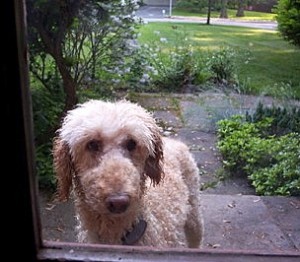
Sammy
I Hate Barking Dogs was my bumper sticker, so I had a problem. The barking dog was my dog; I couldn’t call the cops.
The other day I called my cousin Howard in Colorado; he told me he had been up since 5 a.m. because of barking dogs.
My wife, Alice, is bugged by our neighbors’ barking dogs.
We have new neighbors on the other side. The day they moved in, I said, “Give me the bad news. How many dogs do you have?”
The neighbor said, “None. My daughters are allergic to dogs.” I couldn’t believe it. Even if he turns his house into a crack den, I’m ahead.
Years ago –- when I lived on Oak Road — I approached a neighbor and said, “Your dog is barking.”
The woman stared at me, at her dog (who was yapping 24/7 on a chain in her backyard) and said, “No, he isn’t.”
She didn’t “hear” the dog barking, and she certainly didn’t hear me.
Our dog, Sammy, was a standard poodle. Supposedly poodles are smart and non-allergenic. Doubtful on both counts.
My kids in particular loved Sammy, who died exactly when the youngest kid went off to college.
I knew the pediatrician John Kennell. He should have had two dogs. Him. Nobody else.
—
This clip is “Critters” . . .
—
Yiddishe Cup plays tonight (Wed. 4/25) at Fairmount Temple, 6:40 p.m., Beachwood, Ohio. Free. The community-wide Yom Ha’atzmaut celebration.
April 25, 2012 4 Comments
SHREDDING IT
Cleveland is in the middle of the cereal belt. Shredded Wheat of Niagara Falls, New York, is to the east, and to the west is Kellogg’s of Battle Creek, Michigan.
Shredded Wheat moved from Niagara Falls years ago, but the cereal belt remains. Cleveland is the buckle.
Clevelander Marty Gitlin just published a cereal encyclopedia, The Great American Cereal Book (Abrams Images), featuring “hundreds of images of vintage cereal boxes and spokes-characters — Tony the Tiger, Snap, Crackle, Pop, and Lucky the Leprechaun.”
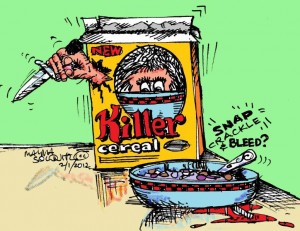
Test-marketed in Cleveland
I had a prospective store tenant who wanted to open a cereal store. He opened down the street and went under almost immediately. He was Cereal Central, aka Cerealicious. Nobody in Cleveland wanted to eat cereal in a store. (He also had a store in Columbus near Ohio State. Apparently, OSU students were willing to eat cereal in a restaurant.)
Most people like to eat cereal alone and not talk about it. That’s my guess.
In my temple bulletin, no bar mitzvah kid’s profile reads: “Jacob is interested in cereal.” More often it’s “Morgan enjoys Sudoku and chatting online, and is a member of the recycling club.”
What is Morgan’s cereal?
Marty Gitlin and I want to know.
***
Musicians — at least one — eat cereal at home after late-night gigs. Musicians can’t fall asleep after gigs. Musicians’ heads are filled with fruit loops of “Simon Tov” and “Hava Nagilah.” (Klezmer musicians’ heads, that is.)
Shredded wheat choices at 1 a.m.: Barbara’s shredded wheat or Quaker shredded wheat. (Shredded wheat is not trademarkable.) I mix Barbara’s with Autumn Harvest (Kashi).
—-
I wrote an “advice column” for the Ann Arbor Observer (February 2012). Check it out: “Hit the Road, Jack . . . A dad’s advice.”
Click here to hear what junior (Jack) is up to today: “Louder Naftule.” The latest in klezmer.
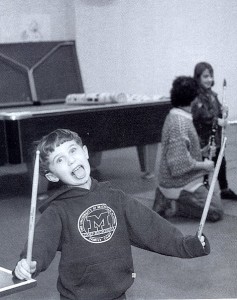
Drummer Jack Stratton, backed by clarinetists Merlin Shepherd and Lucy Stratton. KlezKamp, 1993. (Photo by Al Winn)
February 8, 2012 10 Comments
THE OPTIMAL LEVEL OF JEWISHNESS
If I didn’t lead a klezmer band, I might not hire one. Yiddishe Cup might be too Jewish for me.
“Too Jewish” means anything — or anybody — more Jewish than oneself. Example: Franz Rosenzweig, a German Jewish intellectual, said nothing Jewish — no matter how far out — was alien to him. I tried Franz’s approach: I davened (prayed) with the yeshiva buchers in Boro Park, Brooklyn; drank schnapps at Telshe Yeshiva, Cleveland; and soaked in the mikvah (ritual bath) in Cleveland Heights. Also, I read Rabbi Sherman Wine’s God-is-dead books. I covered a lot of humentashn (bases).
Would I hire a klezmer band?
Yes.
I did. I hired Yiddishe Cup three times — for my kids’ b’nai mitzvot parties. (And I got a decent price.)
1. For my daughter’s bat mitzvah party, I also hired a troupe of hospital-therapy dogs for the cocktail hour.
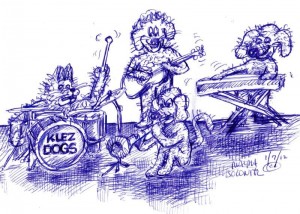
2. For my younger son, we had a DJ party, plus the klez band party. My son organized the DJ party. He hired the DJ — himself.
3. My older son had a trivia quiz, plus the klezmer band. That worked out well. He wound up on Jeopardy!
Yiddishe Cup plays, at minimum, 15 minutes of Jewish music, and we use a dance leader, so everybody knows what to do.
Naturally, the goys like us best. Jews have hang-ups.
I know about Jews and hang-ups. I have belonged to more shuls than the Pope. I was Reform, then Conservative, then Reform, and now Conservative again.
My friends and relatives don’t always hire Yiddishe Cup. But I go to their parties and have a good time. The weddings are enjoyable; the bar mitzvahs are sometimes difficult. The DJ and his “dance facilitators” can be loud and obnoxious. The DJ announces, “The young adults will gather on the dance floor for a group photo.”
Get in the picture yourself, DJ. You look 18. And the “young adults” are not young adults, they’re animals. Stow the glow sticks. Bring out the cattle prods.
The optimal level of Jewishness is Yiddishe Cup with therapy dogs.
—
Yiddishe Cup plays The Ark 8 p.m. Sat (Feb.4), Ann Arbor, Mich. Here is an unrepresentative video from last year’s show:
February 1, 2012 11 Comments
BEST SHOW IN VEGAS
I was back from Las Vegas, attending a Shaker Heights brunch. Several people asked, “Did you play?”
Did Yiddishe Cup play Vegas?
I wish Yiddishe Cup had played Vegas.
I had been in Las Vegas on vacation with my wife, Alice, and older son, Teddy. I had played blackjack.
That was my second trip to Vegas. My first trip was in 1962, when a Vegas waitress predicted I (then-12 years old) would return to Nevada for my honeymoon. That waitress was very wrong.
I prefer outdoorsy vacations.
On my latest trip I won $7.50 at blackjack at the Jokers Wild, then quit. I could hardly breathe in the Jokers Wild –- or in any other Nevada casino — because of the cigarette smoke. I hung around the casino parking lot, waiting for Teddy and Alice to finish up.
My favorite Las Vegas attraction is the Red Rock Canyon, which is similar to Zion National Park, but only 17 miles from Vegas.
The Red Rock performs daily in an original revue that is F’n Crazy! Be a Part of It! Best Show in Vegas for the Past 900 Years!
***
December 28, 2011 5 Comments
WHITE ELEGANT
At Yiddishe Cup gigs, I sometimes send photos to my daughter, Lucy. Like of centerpieces or lighting. I get the photos from my bandmates — some of whom are camera happy.
Lucy is an event planner in Chicago.
I was at a gig in Hunting Valley, Ohio, where the backyard tent was draped with strings of tiny candles. I thought that was noteworthy.
I sent this:
My daughter answered “pretty.” One word. Was that like “whatever”?
How about the white vinyl dance floor? Workers were on their knees scrubbing that white dance floor. My daughter wasn’t too impressed with that either:
Lucy knows about white flooring. In Los Angeles she covered a parking deck with white carpet. She bought 400 shoe-booties at Home Depot for workers, so they wouldn’t dirty the carpet before the guests arrived.
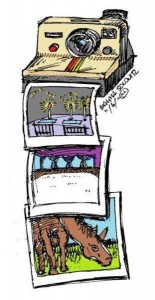 I didn’t get any photos of the horses at the Hunting Valley wedding. The horses — in a stable by the party tent — went berserk during the upbeat recessional. The horses, however, liked the stately and lyrical “Erev Shel Shoshanim” (Evening of the Roses) — the processional.
I didn’t get any photos of the horses at the Hunting Valley wedding. The horses — in a stable by the party tent — went berserk during the upbeat recessional. The horses, however, liked the stately and lyrical “Erev Shel Shoshanim” (Evening of the Roses) — the processional.
Lucy used to ride horses. Why didn’t anybody in the band get a pic of the horses? Lucy would have been impressed with horses, I think.
—
These are the gigs Lucy works:
November 9, 2011 4 Comments
SEARCHING FOR GALICIA
My father, Toby, was a lot like his mother. One of Toby’s mother’s favorite expressions was “Geven-zhe nit a yold.” (Don’t you be a chump.) Toby’s mother owned a candy store, raised four kids almost singlehandedly, buried a three-year-old daughter, and during her retirement years, owned a four-suite apartment building. She was nobody’s sucker.
Anna Soltzberg (née Seiger) occasionally called her grandchildren — like me — foyl (lazy). She lived at our house for a while. I called her Bub — short for bubbe (grandmother). I wasn’t going to call her Bubby. Too effeminate.
Bub was not into baseball; she was into casino (a card game), the television show Queen for a Day; borscht, boiled chicken and cows’ feet. She could eat. She had sugar diabetes. Bub wore bubbe shoes.
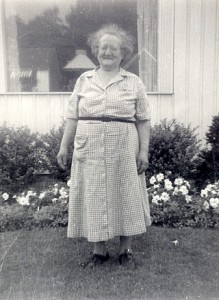
Anna Soltzberg (1884-1964). Circa 1951.
I couldn’t figure out where Bub was from. I couldn’t even find her hometown on a map.
Bub said she was from Galicia, a province in Austria-Hungary. She was from the shtetl (village) of Grodzisko. She came to America at 20.
In junior high I told my friends, “My grandmother is from Austria.” That was dead wrong, but it made sense.
In her old age, Bub lived at my aunt’s house before she moved in with us. At my aunt’s, Bub complained about the level of kashrut (kosher observance). Bub wanted my aunt to not keep kosher. Keeping kosher was too expensive. Bub was an apikoros (non-believer), socialist and cheap.
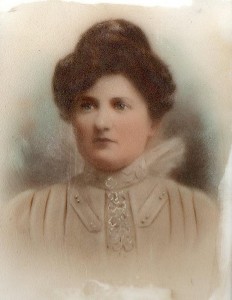
Bub, circa 1904.
At Bub’s funeral — at the shiva (mourning) meal — the question of kashrut came up again. My two aunt Lils (Lil from Delaware and Lil from Washington), plus my Uncle Itchy, were at our dining room table.
Uncle Itchy, sitting next to Delaware Lil, asked, “You keep a kosher house?”
“Yes,” said Delaware Lil.
Itchy, slapping his hand down on the table, said, “Then why are you eating this meat? It’s not kosher!”
Washington Lil, also slapping her hand down, said, “Ain’t that a hypocrite!”
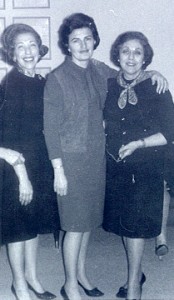
Washington Lil (left), Julia Stratton, Delaware Lil. 1964
“In other words, it’s either everything or nothing?” said Delaware Lil.
“Yes,” said Washington Lil.
“That’s a very simple philosophy,” said Delaware Lil.
“Yes, it is,” said Washington Lil.
My mother, Julia, interrupted with: “Pass the treyf meat.” (Non-kosher meat.) Mild laughter. My mom was the peace-maker.
And the Lils didn’t talk to each other for a long time. Years.
. . . Grodzisko, Galicia, Austria-Hungary. I found it about 20 years later, in the mid-1980s, on the Shtetl Finder map. The village’s Yiddish name was Grodzisk (pronounced GRUD-zhisk), about 60 miles west of Przemysl. The various shtetls (villages) had so many different names. That was the trick. And there were several Grodziskos.
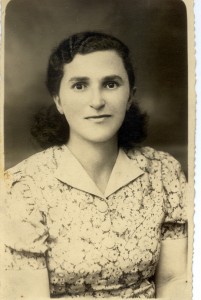
Mili Seiger 1939
During my research, I came across a family postcard, postmarked “May 1, 1939, Grodzisko.” It was from cousin Rachela Seiger. It was in Polish and said, in brief, “How are you?” On the flip side was a photo of Rachela’s sister Mili.
The Germans invaded Poland four months after the postcard was mailed.
I looked up “Mili Seiger” and “Rachela Seiger” on the Yad Vashem (Israeli Holocaust museum) online archives. There were so many Seigers, Siegers, Zygers, Zaygers and Zeigers, I couldn’t find Mili or Rachela.
There are three types of Jews. Not Reform, Conservative and Orthodox. Try American, Israeli and victims of the Holocaust. Each about a third. These are my people.
—-
This story was cross-posted on The Forward, online, last month.
Thanks to Yiddishist Lori Cahan-Simon for help on the expression “Geven-zhe nit a yold.”
Footnote . . . Plotting Grodzisko by Teddy Stratton, 1998:

March 23, 2011 10 Comments
THE KLEZMER DINNER PROJECT
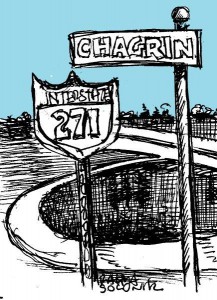
Go to a restaurant — in this case, Corky & Lenny’s in Cleveland. And listen to a klezmer history lecture while eating.
It’s only $45.
We will celebrate the Cleveland klezmer sound. Legend has it, this sound came together at I-271 and Chagrin Boulevard, to become one of the most combustible klezmer sounds the world has ever seen. 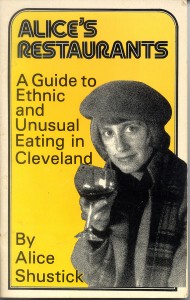 Alice Stratton (née Shustick), author of Alice’s Restaurants (1981), will share her recipes and Cleveland food discoveries. This could be an amazing Cleveland klezmer meal.
Alice Stratton (née Shustick), author of Alice’s Restaurants (1981), will share her recipes and Cleveland food discoveries. This could be an amazing Cleveland klezmer meal.
March 10. The Supper-charged Klezmer Dinner
Appetizers:
Don Hermann’s Pickles from Garrettsville, Ohio.
Gefilte fish pâté
Falafel balls from the Falafel Queen, Alice Stratton
Bread:
Challah from the Park Synagogue preschool
Soup:
Precision matzo ball soup. Cleveland Punch & Die Co.
Entree:
Smokin’ salmon. Pot Sauce Williams
Sides:
Alice’s farfel (egg barley) and mushrooms
Dessert:
Star of David lollipops from the Chocolate Emporium
Beverages:
Mr. Meltzer’s line of Seltzer Boy! products
–Make reservations now for this fictional March 10 event–
***
Future Klezmer Dinner Project events:
4/16 Klezmer Goy
Alan Douglass — an original member of both the Kleveland Klezmorim and Yiddishe Cup — talks about his life as Klezmer Goy. He’ll recite the bruchas (blessings) over both the wine and cheese to show he knows some Hebrew (like Italians on the Lower East Side used to know a bisl Yiddish).
The meal: rugelach, mandelbroit, hamentashen, honey cake and Cinnebuns.
5/3 Fear in Loadin’
Irwin Weinberger, Mr. Jewish Music Ohio, talks about eating at gigs. He shows how a pro musician loads a plate. 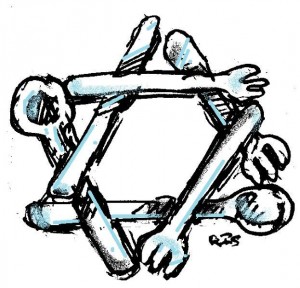 Trick number one: Put lettuce on top of everything, so the host thinks you’re eating only salad.
Trick number one: Put lettuce on top of everything, so the host thinks you’re eating only salad.
The meal: tschav (cream of sorrel soup), creamed herring on shmura (handmade) matzo, turkey pot pie, and a wedding cake made from real butter, real vanilla extract and real waiter’s eggs.
6/13 Die Kleveland
Greg Selker, founder of the Kleveland Klezmorim, speaks about the early days of the group. He’ll show 1985 videos from Booksellers, Pavilion Mall, Beachwood, Ohio.
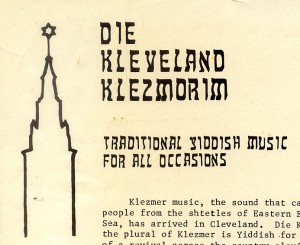
Flyer, circa 1985, designed by Alan Douglass
Booksellers was probably the first suburban mall bookstore in America with a café.
The meal: pickled herring with mustard sauce; Jewish fried chicken; butter beans and gelato.
7/17 Pies
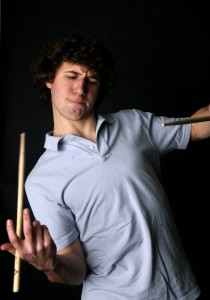
Jack Stratton, 2008. (Photo by Shay Spaniola)
Jack Stratton, Yiddishe Cup’s alternate drummer, demonstrates the Jewish rhythm method. Think “in the pocket.” In the groove. Be down with the knish, the Jewish pie. Wear one on shabbes. Also, be down with the empanada pie (Latin music). And appreciate the pasty, the miner’s pie from Michigan’s Upper Peninsula. It’s all music.
The meal: cold borscht, tsimmes (fruit stew), Mr. Brisket soaked in Coke, albondigas (Sephardic meatballs) and butter kuchen.
8/15 The Happy Bagel
Daniel Ducoff, a.k.a. Sir Dancelot, talks about happy times — how to make money from dancing at bar mitzvah parties and weddings. Ducoff shows us the Happy Bagel, his latest dance. And we eat bagels. 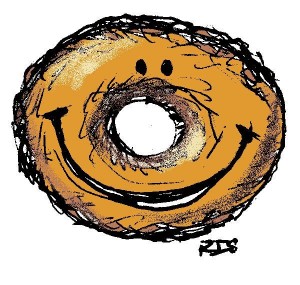 Not hole-less, soulless bagels. We’ll munch authentic Chew-ish bagels (crispy on the outside, chewy on the inside) with holes big enough to stick shabbes candles in and light.
Not hole-less, soulless bagels. We’ll munch authentic Chew-ish bagels (crispy on the outside, chewy on the inside) with holes big enough to stick shabbes candles in and light.
The meal: Tractor-size bagels from Russia; chicken liver with gribens (cracklings); and fruit tarts.
9/16 The Crazy Mom
The late Barbara Shlensky, party planner, talks about the “Crazy Mom” phenomenon. How much Valium is too much for Mom’s cocktail? What if Mom jumps on the bandstand and screams, “Stop right now! The floor is collapsing!” 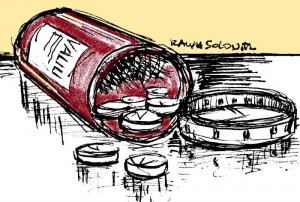 What about Mom’s 45-minute cocktail hour that runs two hours, and the now-drunk guests are accidentally breaking wine glasses and dripping blood onto the white vinyl dance floor? Finally, has there ever been a $100,000 bar mitzvah party in Cleveland? Whose? Barbara answers that.
What about Mom’s 45-minute cocktail hour that runs two hours, and the now-drunk guests are accidentally breaking wine glasses and dripping blood onto the white vinyl dance floor? Finally, has there ever been a $100,000 bar mitzvah party in Cleveland? Whose? Barbara answers that.
The meal: Thai kreplach; cauliflower kugel; stuffed cabbage with cranberry sauce; and pistachio macaroons.
—
See the next post, too, please. More food references . . .
March 2, 2011 7 Comments
WALKMAN MAN
Walt Mahovlich, the leader of the Gypsy-style band Harmonia, had hundreds of cassette tapes in his living room. He had custom-made bookshelves lined with tapes. There were Yugoslavian field recording from the 1970s and commercial ethnic tapes from the 1980s and 1990s. And he had dubbed some LPs to tape.
Walt’s wall o’ tapes was organized by nationality: Albanian, Croatian, Hungarian, Jewish, Macedonian, Romanian, Rusyn, Serbian, Slovak and Turkish.
A tape — a brand-new chrome tape with Dolby — often sounded as good as the original LP. But few dubbers bought chrome. Even the commercial tapes released in the 1980s weren’t always chrome.
One big downside to tape: the tape player would occasionally eat the skinny tape, and you’d have to splice it back to health.
The cassettes, with their cases, were compact. Give them that.
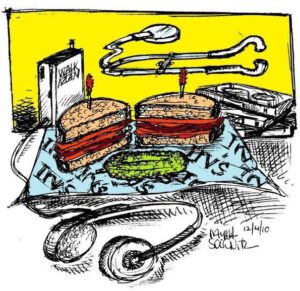 I bought a Sony Walkman cassette player in 1981, just prior to my first son’s birth. My wife, Alice, went through three 24-hour shifts of obstetricians before she delivered. I had the cassette tapes (dubbed jazz LPs) and two corned beef sandwiches from Irv’s Deli. I was set. My wife had complications.
I bought a Sony Walkman cassette player in 1981, just prior to my first son’s birth. My wife, Alice, went through three 24-hour shifts of obstetricians before she delivered. I had the cassette tapes (dubbed jazz LPs) and two corned beef sandwiches from Irv’s Deli. I was set. My wife had complications.
The doctors wanted to check it out. Not the complications. The Walkman. They had never seen one.
Three years ago I bought a Chinese Walkman knock-off for $40 at Radio Shack. I thought the Walkman might disappear.
Sony recently announced the end of Walkman cassette player production.
Two words: Stock up.
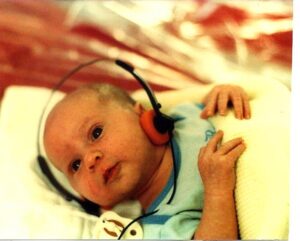
Teddy Stratton, 1 month
***
Walt Mahovlich’s wall o’ tapes still exists in the same West Side living room.
Last week Walt said, “I should transfer my tapes to digital. Who knows how long they’ll last — the tapes. But what I really need to do is record a 78 — something that will really last!”
“You want to record a 78 RPM?”
“Yes. Alan [Yiddishe Cup’s keyboard player] has a 78-making machine. I saw it years ago. I want to record a tune, then prematurely age the disc — the 78 — and place it in strategic places for people to find.”
“Like at Goodwill stores?”
“Maybe. It’ll be a hoax, like Piltdown Man.”
“An original tune?”
“No, a clarinet piece I learned years ago. I’ll call it ‘Der Freylekher Bulgar’ for the Jewish market and ‘Lerinsko Narodno Oro” for the Macedonians. It’ll be the same tune, two markets. Like Tarras.” *
“Do you have a Walkman?”
“No, I’ve never had one.”
“You should get one.”
“I have a tape deck. I’m set.”
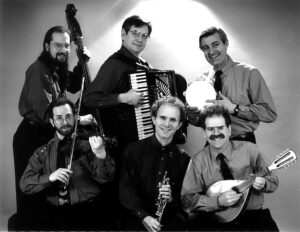
Walt, on accordion, had an aura. 1983
—–
* Dave Tarras, klezmer clarinetist, sometimes “re-gifted” his Jewish tunes to fit the Greek market, and vice versa.
“Der Freylekher Bulgar” is Yiddish for “The Happy Dance.” “Lerinsko Narodno Oro” is Macedonian for “Lerin Region Folk Dance.”
Thanks to Lori Cahan-Simon, musician and Yiddishist, for the correct spelling on “Der Freylekher Bulgar.”
December 10, 2010 3 Comments
DOWN AND OUT IN TROY, MICHIGAN
I was down and out in a Marriott hotel in Troy, Mich. The bride, several hours earlier, had told me, “I can’t dance in these shoes. Can I just watch the hora?”
She watched. I asked her three times if she wanted to be lifted on the chair. No, she said three times. The bride and groom stood in the middle of the hora circle like statuettes on a wedding cake.
There was no place to walk at the Marriott, which was in a large shopping development.
I wrote notes to myself on the hotel stationery to justify my existence. My truest observation: “Yiddishe Cup is providing a valuable service for the Jewish communities of the Midwest.”
The Marriott room had 8 pillows, 10 towels, 2 beds and 2 bathroom mirrors that showed everything.
I couldn’t justify 8 pillows, 10 towels, etc. I just couldn’t. That bride should have danced.
Luckily the hotel windows didn’t open.
—-
Yiddishe Cup plays this Sunday (Nov. 7, 4 p.m.) at the Brecksville United Church of Christ, Brecksville, Ohio. www.brecksvilleucc.org
—-
REMINDER: This blog now updates twice a week: Wednesday and Friday.
November 5, 2010 1 Comment
WOLVERINE BLUES
1. RAH-RAH AND SO-SO
A simple fall pleasure is walking around Shaker Lakes listening to Michigan football on the radio.
I came by this diversion fairly recently. My older kids went to liberal arts colleges with no football teams. I figured my youngest child would too. I took him to Oberlin on a college tour and said, “Can you see yourself here?”
“In a word, Dad, no,” he said. “There’s not enough sports talk.” Jack, the youngest, wanted rah-rah.
He went to Michigan and got rah-rah. We rehashed the football games his freshman year.
I monitored the university’s Web site like a helicopter parent. I told my son to audition for the pep band, the Hillel a cappella group, the school’s percussion group and anything else he could think of. I wanted him to find a niche at the Big U.
And I wanted Michigan to win at football, because my son was so rah-rah.
I followed the football games on the Internet my son’s first year. I didn’t know about the games on Cleveland radio. That was stupefying — the Internet — like staring at a tickertape: Joe Blow . . . 3 yards . . . 3rd and 5 . . . M 46 yard line.”
Then I serendipitously found Michigan football on Cleveland radio. No more squinting at the computer. The announcer promoted Detroit pizza parlors and grocery stores. I felt like a ham operator picking up an exotic locale. “Gratiot at 8 Mile.” CKLW radio — the border blaster — was sending out the Wolverine word from Windsor.
Michigan football isn’t on CKLW this year. It’s on a weak FM station from Detroit. End of my fall bliss.
The team used to be good, then suddenly stunk. The university hired a new coach.
I asked my son what he thought of the new guy.
He said, “Who is it?”
He didn’t know about Rich Rod! (Rich Rodriquez, the new coach.) Jack had fallen under the sway of the football atheists at the Residential College and music school.
I knew more Michigan football than my son. I was now rah-rah and he was so-so. Odd.
***
2. SONNY, LISTEN
A PhD classical music student at the co-op house in Ann Arbor didn’t like my practicing. He didn’t like jazz, period. And he didn’t like my girlfriend. He called her a “hole,” which was black slang around 1970. This guy, though, was a tall blond Texan.
Tex would answer the house phone and announce to one and all: “Bertie, your hole is on the line.” (“Bertie” wasn’t too cool either.)
I punched him. He was seated on the couch in the co-op living room. I hit him and his coffee went flying. He stopped bugging people — at least me — after that. He thought I was nuts.
I wasn’t nuts. I haven’t attacked anybody since, except a teenager I punched when I taught at an ESL school. (Different story.)
In 1970 Miles Davis had just released Bitches Brew, the first big-time jazz-rock album. I borrowed recordings of Hank Crawford, Lou Donaldson and Rufus Harley from black students. I went to Baker’s Keyboard Lounge in Detroit to see Gene Ammons, Sonny Stitt and Roland Kirk.
Tex became an administrator in the Michigan music school. Mazel tov. He stayed there forever.
My youngest kid went to music school at Michigan. Mazel tov. I occasionally went to see my son perform and kept an eye out for Tex. I didn’t run into him. I was ready to apologize, unless he called me Bertie again.
Bertie? That numbskull, I swear . . .
October 13, 2010 6 Comments
PORTRAITS
Two-thirds of the art in my house is by Irwin Weinberger, Yiddishe Cup’s singer. Irwin is also a painter and middle-school art teacher.
He did a portrait of my kids 19 years ago. I thought the kids — those pipsqueaks — were cute. But their pipsqueak phase dragged on for years; I would stare at that painting and say, “Grow up already!” Schlepping kids crosstown to gymnastics meets was not fun. Schlepping the youngest child to an 8 a.m. hockey game in Parma Heights was not fun. Sitting through my daughter’s swim meets was not entirely pleasant. (The diving part was pleasant, but the swimming races — which she had nothing to do with — weren’t fun.)
As it turned out, the whole thing — childrearing — lasted about two weeks.
Yiddishe Cup has been in existence 21 years, and that, too, has felt like two weeks. One day — back in 1989 — we were playing a Cleveland Heights street fair, and the next day– 21 years later– we were playing a Cleveland Heights street fair.* What’s with that?
We — the Yiddishe Cup musicians — enjoy the short drive to work. We are in our own backyard, kind of like the working musicians in Las Vegas or Branson, Mo. The downside to playing Cleveland a lot is everybody has heard us a million times.
Make it new. Or go nuts.
The newest Yiddishe Cup recruit, our drummer, has been with us 12 years. We have new music, but not new guys.
I rarely put the musicians’ names front and center. It’s all about Team Yiddishe Cup. What if a Yiddishe Cup “star” leaves? That would mess up the band’s publicity.
The band’s PR photos are like my family portrait. Same guys, basically. Why change the photos? We look the same as we did in the 1990s. I think so. It’s the same guys.
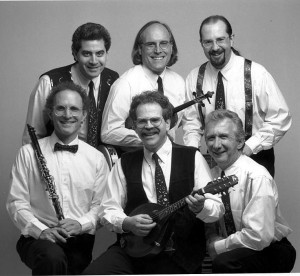
Yiddishe Cup, 1998. An outtake. The arrow in Irwin's head messed up this shot. (Photo by Charles J. Mintz)
—
* Footnote: Yiddishe Cup did not play a Cleveland Heights street fair in 2010. However, the band did play Parade the Circle in University Circle — close to, but not in, Cleveland Heights. And last year the band played for the outdoor movie/concert night at Coventry (Cleveland Heights).
—-
2 of 2 posts for 9/8/10.
L’shana tovah. (Happy New Year.)
Yiddishe Cup is at Fairmount Temple Wed. Sept 29 and Park Synagogue Thurs. Sept. 30 for Simchat Torah. Cleveland.
September 8, 2010 4 Comments
TO KUGEL
Yiddishe Cup’s biggest fan is Lea Grossman.
She got us a gig at The Ark, the premier acoustic music club in the Midwest. She kugel-ed The Ark’s program director. She delivered a noodle kugel to his office in Ann Arbor, Mich. He liked it and he hired us. (Hopefully our music had something to do with the booking too.)
I had been avoiding Ann Arbor. I had attended college there during the hippie era and hadn’t learned much. There had been a quasi-ban on book learning. The foreign language requirement had been oppressive, according to protestors, and the Psych teaching assistants led T-Groups and gave everyone A’s. Until I signed up. Then it went to pass/fail.
When my kids started looking at colleges, I told them Michigan was a swamp. Too big, too impersonal.
I even rooted for Ohio State over Michigan. I harbored some serious animosity toward the Blue. I told Michigan to stop sending me alumni mail. But for $75 I hedged and sent a donation every year. You never knew.
Thanks to Yiddishe Cup super-fan Lea Grossman, I wound up back at Michigan big-time. Lea is 60-something but gets around like a coed, and she promoted our band to everybody and helped put signs on every phone pole. The woman can dance, party and cook. She knows every Jewish dance, and has sung “Tumbalalaika” on stage with Yiddishe Cup at The Ark.
Lea lived near North Campus in a university-affiliated retirement community. It was like a dorm for seniors — real seniors. North Campus — the last time I had been there — had been a music school, a smattering of grad student housing, and one undergraduate dorm. It had been the end of the earth. You had to take a bus to get there. (Still do.) The dorm was called Bursley, as in “brrr, it’s cold.”
For Yiddishe Cup’s first Ark appearance, I picked January. Not too many rational Clevelanders scheduled weddings in January, so we had an opening.
Ann Arbor’s weather was just like Cleveland’s. Bad. And we got a huge crowd at the club. That was weird. The difference between Cleveland and Ann Arbor was Michigan had a puffy coat brigade. The worse the weather, the more the puffy coaters came out. It was almost an Upper Midwest can-do chic — like something from the Progressive Era — a bunch of irregular Jews in irregular puffy coats.
On our first Ark gig, my youngest son stayed in the North Campus dorm, Bursley. He was in eleventh grade. (He also played drums on the gig.)
He liked the school and wound up at Michigan.
So I returned to the swamp– to see my son, and play gigs. (My other kids went to small liberal arts colleges.)
I couldn’t get the Michigan Daily to write up Yiddishe Cup. Ever. I tried. The reporters wouldn’t return calls. Maybe they weren’t too crazy about talking to a middle-aged klezmer guy.
When I had been a Daily reporter, I had enjoyed the John Lennon and Miles Davis assignments but not the local-angle profiles, like when I wrote up the Discount Records clerk who played sax. (That sax player, Steve Mackay, was good, and cut some records with the Stooges later.)
Lea didn’t know who to kugel at the Daily; the Daily reporters were always rotating in and out. They missed a good dish.
Lea moved to New Jersey a year ago.
—-
“To Kugel,” this post, first appeared in the Washtenaw (Ann Arbor, Mich.) Jewish News, Dec. 2009/Jan. 2010.
—-
Check out the new video clip “Driving Mr. Klezmer,” live from The Challah Fame Cafe. The Klezmer Guy blog exits the loch (your computer). Klezmer Guy walks and talks. Rated scary.
—-
Yiddishe Cup plays The Ark, Ann Arbor, Mich., 8 p.m. Sat., Jan. 23. Guests include Hawaiian guitarist Gerald Ross, comedian Seymour Posner, and members of the soul/klez band Groove Spoon.
January 6, 2010 3 Comments

